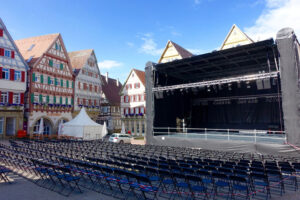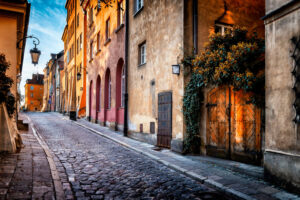

Romance studies is best defined as the place where language meets culture.
But culture is a big idea, and language means so much more than just words. As the name implies, romance studies is a little esoteric in the sense that it asks us to try to conceptualize the idea of literature intersecting with film, to examine the place where art meets religion and even look at the ways in which architecture and music might have more in common than we might first realize.
But it’s not just any language or any culture. The Romantic cultures are primarily thought of as those of the Indo-European nations of France, Italy, Spain, Portugal and Romania. So, naturally, the Romance languages are the Vulgar Latin Based languages of those cultures – French, Italian, Spanish, Portuguese and Romanian.
Romance studies involve both learning one of the Romance languages, and experiencing the culture through that language. Through language, you can experience a culture intimately through its books and film, much like a native would. This is a unique and enriching experience that’s right at home within the liberal arts.
Romance studies has a rich heritage and an exciting future that’s right at home as part of a liberal arts curriculum.
Some of the most interesting liberal arts approaches to exploring romance studies are:
- Researching the intersectionality of fields like film and literature to see how they combine to create a snapshot portrait of culture
- Examining architecture and how it’s a cultural expression of necessity, combined with philosophy and aesthetics
- Studying abroad: experiencing the modern-day real-life sights and sounds of people who represent a direct personal and cultural link to the romantic past
Literature and Film are Liberal Arts Disciplines that Illuminate Culture
 There’s nothing quite like reading Cervantes’ Don Quixote in the original Spanish. Operas and film are a whole new experience in their original languages. You can experience the subtlety of Bizet’s Carmen and the nuance of Fellini’s Amarcord when you hear the original language and you’re not trying to keep up with reading the subtitles.
There’s nothing quite like reading Cervantes’ Don Quixote in the original Spanish. Operas and film are a whole new experience in their original languages. You can experience the subtlety of Bizet’s Carmen and the nuance of Fellini’s Amarcord when you hear the original language and you’re not trying to keep up with reading the subtitles.
Imagine sipping a glass of Chianti at a warm summer’s outdoor film screening in a Venetian piazza while you snack on cicchetti… Even if you were watching that same Italian classic film downtown at your local AMC with a bucket of popcorn, it wouldn’t be quite the same.
Today’s modern ideas and progressive thinking can shed completely new light on how old classics are understood, even more so when you can understand them in their original language:
- Denis Diderot was a prominent French enlightenment thinker. Living between 1713 and 1784 he made contributions to philosophy, science, law, literature, and non-fiction but his Bohemian habits meant a life of poverty until he became the personal librarian of Catherine the Great.
- Dante Alighieri was born in Florence around 1265 and died in Ravenna in 1321. His Commedia (translated in English as the Divine Comedy) is still a masterpiece today and sheds light on the culture and history of Medieval Europe.
- Marguerite Duras spoke fluent Vietnamese and studied philosophy in school. Born in 1914 and living to be 82 years old, she was a prolific writer penning essays, fiction, plays, and more. She’s behind such works as L’amant (The Lover) and wrote the screenplay for the New Wave film Hiroshima mon amour.
In Romance Studies Architecture is A Cultural Comment on Values
 It’s already inspiring to read about the Renaissance in a history textbook, but it’s in another universe to actually walk down the cobblestoned streets of Florence –la culla del Rinascimento– past the Cattedrale di Santa Maria del Fiore or to look down at the green waters of the Arno River from the Ponte Vecchio.
It’s already inspiring to read about the Renaissance in a history textbook, but it’s in another universe to actually walk down the cobblestoned streets of Florence –la culla del Rinascimento– past the Cattedrale di Santa Maria del Fiore or to look down at the green waters of the Arno River from the Ponte Vecchio.
We appreciate architecture in America, especially the surviving historical buildings that were built all the way back in the 19th century. Our architectural styles often involve the prefix -neo, for example: Neo-Gothic, Neo-Baroque, Neo-Classical, Neo-Byzantine.
Studying abroad in a country where they speak a romance language provides the opportunity to see the originals that inspired the -neo versions we’re accustomed to.
There’s an awe-inspiring difference between seeing the replica of the Eiffel Tower in Paris Las Vegas and the real deal in France, and that’s to say nothing of entire cities built from marble in the original style of the times:
- The Cathedral of Santa Maria del Fiore in Florence, Italy – In the city known as being the birthplace of the Renaissance, Florence’s main cathedral preceded Italy’s re-awakening and is built in classic Gothic style complete with ogival arches, rib vaults, and flying buttresses.
- El Escorial in Madrid, Spain – The largest example of Renaissance architecture in the world, this historical seat of the monarchs of Spain is built with due consideration given to the Greek and Roman building philosophies of proportion, symmetry, and geometry that are characteristic of its architectural style.
- Saint-Germain-des-Prés in Paris, France – With its architectural Dark Ages Romanesque style paying homage to its lineage in “Roman-like” design, this nearly 1,500-year-old structure is defined by its large towers, ornate arcades, and round arches.
- Saint Peter’s Basilica in Vatican City – The seat of the Bishop of Rome, also known as the Pope, this mothership demonstrates quintessential Baroque characteristics like grand colonnades and dramatic domes with ornate –even opulent– decorations. The style was founded as a Catholic argument against the Reformation to inspire amazement and awe, and that argument is perhaps even more cogent in the context of today’s modern architectural styles.
Architectural style is much more than a way to build a stable structure; it’s a way of showing respect to the philosophies of past civilizations, looking to the future, and making a culture’s own mark on what constitutes beauty and value. It’s a perfect subject for romance studies within the context of a liberal arts education.
Studying Abroad – A Liberal Arts Right-of-Passage for Romance Studies
 You can study electronics or auto mechanics in a textbook, but no matter how many manuals you read it’s a completely different experience when you actually flip the switch in a fuse box or loosen the oil pan bolt. It’s the same for romance studies and studying abroad.
You can study electronics or auto mechanics in a textbook, but no matter how many manuals you read it’s a completely different experience when you actually flip the switch in a fuse box or loosen the oil pan bolt. It’s the same for romance studies and studying abroad.
It’s one thing to rattle off a saying like, “je pense, donc je suis,” or to quote your favorite Italian lines from a Monteverdi madrigal. But knowing academic French, Italian, or Spanish can only get you so far. What do you say when you clumsily body-check an elderly person on the subway in Rome? Or when you spill your café au lait on the attractive, smartly-dressed Parisian you’re sitting next to on the TGV?
This is why it’s so important to study abroad. This is where the classroom-bound academic rubber meets the modern-day cultural-reality road. The textbooks don’t teach you how to handle the pickpockets waiting outside of churches or what a street smells like after a typical weekend of mass student all-night parties.
After all, if you’re going to specialize in romance studies, you’d better know how to ask someone out on a date.
Studying abroad is the ultimate intersectionality experience: it lets you combine your physical senses with what you’ve been spending years reading about in textbooks:
- The taste of a fresh cannoli, pain au chocolat, or crema Catalana
- Actually seeing Sacré-Cœur in Paris, the Sistine Chapel in Vatican City, the Colosseum in Rome, or Alhambra in Granada with your own eyes
- Hearing a French symphony perform a piece by Berlioz in Lyon, Spanish street performers do a troubadour act, or an Italian tenor sing Buongiorno a Te in Modena
- The smell of the stereotypical European who doesn’t know what deodorant is, or worse, the smell of the typical European teenager who does and believes it’s copious amounts of Axe
- The touch of putting your hand on the steel of the Eiffel Tower, the marble of the Roman Forum, or the stone of the Muslim Walls of Madrid
Liberal Arts Romance Studies Are More Exciting Than Ever
 There hasn’t been a more exciting time to learn about romance studies than now. The world is more interconnected than ever. You can book your next hostel, find your next tandem language study partner, or locate the hottest nightclub in the old city all on a device that fits in the palm of your hand. Browsing host families for your study abroad experience or the person you’re meeting for dinner and drinks is as easy as swiping left or right.
There hasn’t been a more exciting time to learn about romance studies than now. The world is more interconnected than ever. You can book your next hostel, find your next tandem language study partner, or locate the hottest nightclub in the old city all on a device that fits in the palm of your hand. Browsing host families for your study abroad experience or the person you’re meeting for dinner and drinks is as easy as swiping left or right.
Check the opening hours of a museum online, or better yet, take a free virtual tour.
Looking forward, political experiments like the European Union are in full swing, with an ever-raging debate between protectionist ethno-nationalists and free-market multiculturalists. People who can draw on the philosophical and cultural luminary traditions from the past will be the ones who make the best political arguments that will shape tomorrow’s future.
That’s where romance studies fits in; the intersection of cultural expression and politics; the past and the future. And it fits perfectly into the context of a liberal studies education.





